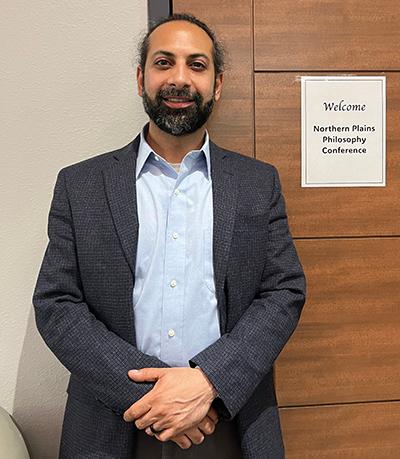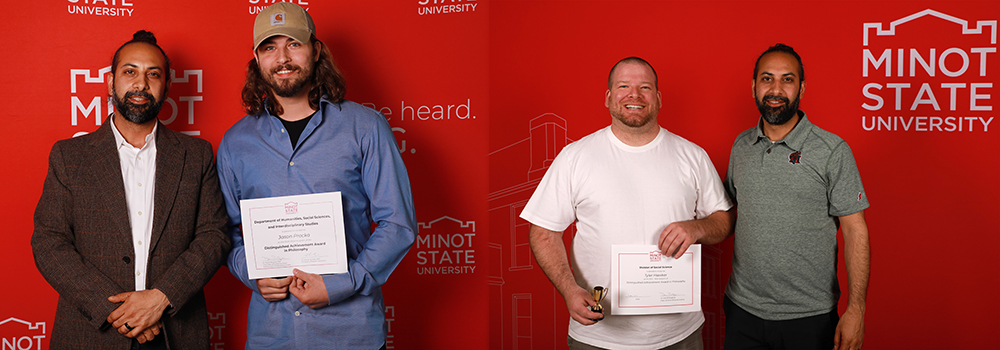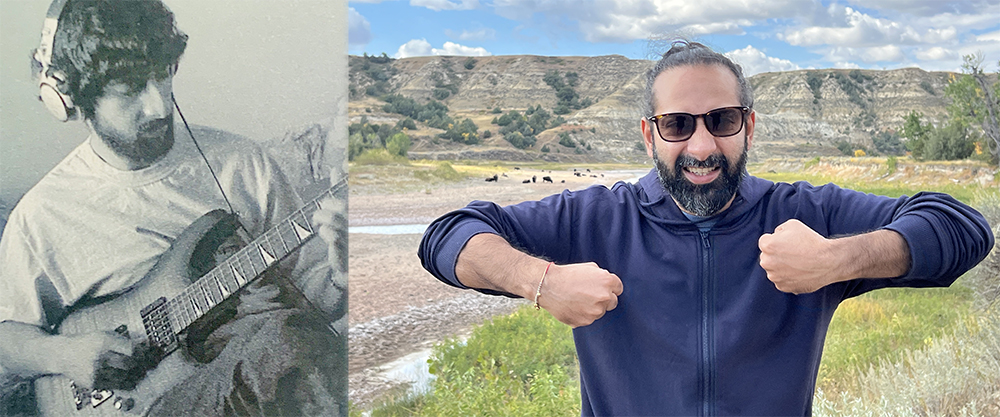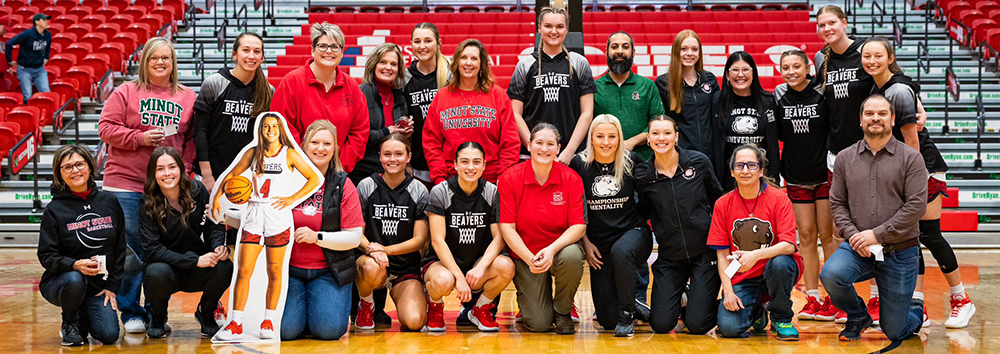Onward: An interview with Raman Sachdev

MINOT, N.D. – Minot State University’s Raman Sachdev feels he was a philosopher from an early age as a high school teacher nicknamed him and a friend “Plato and Aristotle.”
But it was after taking a philosophy class in college that pushed him to take his eventual career path a bit more seriously. As an assistant professor and program coordinator at Minot State, he is now the one introducing students to the discipline.
Minot State’s University Communications visited with Sachdev to find out what brought him to Minot State and why philosophy is so important in a well-rounded education.
You were hired in 2022, so you’ve spent two academic years here. How has your teaching experience been at Minot State?
RS: Over the past two years, I’ve had a pleasant experience teaching here at Minot State. I’ve gotten to know most of my students on a first name basis, and we get along swimmingly. Through lighthearted conversations, comedic interludes, absurdist non-sequiturs, and, in keeping with the subject of philosophy, intensive moral arguments, we become comfortable with and challenge one another in our classroom discussions. Perhaps the greatest joy of teaching at MSU thus far has been introducing philosophy to my students, most of whom have had very little structured exposure to the discipline.

What were some of the reasons you chose to come to MSU?
RS: From the numbers alone, by my estimation, it is five times more likely for a high school applicant to be accepted into an Ivy League institution than for a person holding a Ph.D. in philosophy to secure a tenure-track job. To me, this statistic is mind-boggling and indicates many things, not the least of which is the fact that because of the competitiveness of the job market, there are a substantial number of qualified Ph.D.s in philosophy who are currently unemployed.
It goes without saying, then, that I was fortunate to be offered a tenure-track position at Minot State, and that I worked diligently to obtain it. At Minot State, I appreciate the institutional and departmental support that is given to faculty members to help grow their respective careers as both teachers and scholars. To take just one example, MSU helped to fund my travel and lodging expenses for research presentations that I gave at multiple conferences over the past two years.
Do you have an early highlight or two from your time at Minot State or in the Magic City?
RS: It was August 2022, and my wife and I had just moved to Minot. Our first outing was the Community Rocks! event at MSU’s outdoor Summer Theatre. We were blown away by the beauty of the theatre and its gorgeous accompanying view of the city. We were also quite impressed by the talent and the infectious energy of the band and the orchestra. That was quite a special introduction to the Magic City.
Moreover, we were pleasantly surprised by the warm welcome given to us by colleagues in my home department and by members of the university at large. Right from the beginning, the MSU community made us feel right at home.
What are some of the ways that you approach teaching philosophy?
RS: The way that I teach philosophy is inspired by a handful of highly effective philosophy teachers that I learned from first as an undergraduate and then as a graduate student. For instance, from a young PhD student who taught Introduction to Philosophy when I was a freshman in college, I came to understand the value of conversing with students rather than lecturing at them. If I take an active interest in getting to know my students, they will want to learn from me.
From a few philosophy professors at the University of Chicago, where I was a graduate student, I learned how to structure and give meaningful lectures on complex philosophical ideas. Finally, from my PhD advisor at the University of South Florida, I gleaned the importance of providing historical and intellectual context when introducing central figures in the history of philosophy.
Tell us about your academic career: where did you study, what degrees did you earn, and how did those experiences shape you as a professor?
RS: I began my undergraduate career at Dartmouth College in Hanover, New Hampshire. I spent about a year there but had a difficult time adjusting to the environment. Frankly, I wasn’t equipped to go away to college and to live on my own. So, I returned to my hometown of Chicago and transferred to Loyola University, where I obtained a B.A. in philosophy in 2006. After a semester-long stint in law school, I decided that instead of the law I wanted to pursue academic philosophy as a career. I attended graduate school at the University of Chicago, where I enrolled in mostly philosophy courses and graduated with an M.A. in the humanities in 2009. Soon thereafter, I began a Ph.D. program in philosophy at the University of South Florida, where I graduated in 2019.
My experiences in college and in graduate programs have taught me the value of resilience and of stamina-building with regard to studying. I’ve learned the importance of carefully reading and taking my time with philosophical works; sitting with and working out philosophers’ ideas; and writing about them in a way that aims to advance the state of the art.

Were you always interested in philosophy and what are some of the reasons you chose that as your undergraduate and doctorate degrees?
RS: I suppose I’ve been a philosopher from a young age. I recall my high school choir conductor overhearing me and a friend discussing some ridiculous thought experiment and afterwards pointing to the two of us and saying, “There goes Plato and Aristotle.”
It wasn’t until I took my first philosophy class in college, however, that I began to take philosophy seriously. I distinctly remember reading “Descartes’s Meditations” and being profoundly moved by his radical skepticism. He asked questions like, “How can I know with absolute certainty that I’m not in a dream?” It’s no coincidence, then, that to this day I have an affinity for skeptical philosophy.
What is your elevator speech on why students should be interested in philosophy?
RS: It’s natural to have beliefs, e.g., those about God, religion, and morality. Philosophy prompts us to ask ourselves how we can justify those beliefs. We are goaded to investigate our own views so that we may better understand them and develop an ability to support them with reasonable arguments. This process can help us to understand who we are and what we're about.
Through the study of philosophy, we learn to appreciate the views of others with whom we disagree. By doing so, we can become balanced in our judgments and develop the skills to defend our own positions on the issue at hand.
The ancient philosophers tell us that philosophy can show us how to live a good life. Studying the ideas of these thinkers might help us to effectively deal with the inevitable ups and downs of life and to develop something akin to happiness along the way.
What do you like to do outside of the classroom: family, hobbies, or other areas of interest?
RS: I have been a musician since as far back as I can remember. I’ve had a natural sense of rhythm from a young age, so it only makes sense that I gravitate towards percussion. The first instrument I took seriously and formally learned to play was the drum kit. Later, as a teenager, I taught myself the guitar and began to compose songs. I developed my voice by singing in school choirs, ensembles, and barbershop quartets, and by playing in rock bands. Over the years, I’ve written and recorded dozens of original songs and instrumental cues, many of which can be heard in the background of tv shows on channels that include MTV, HGTV, and NBC.
In addition to my love for music, my wife and I enjoy traveling. We’ve spent time in India, Australia, and several countries in western Europe. Since our move to Minot, we’ve taken advantage of Minot International Airport’s easy access and have visited Phoenix and Sedona (Arizona), Orlando, Denver, San Francisco, and Charlotte (North Carolina), among other parts of the country. We look forward to exploring many more places, not just in the U.S., but all over the world.
What else are we missing in telling your story?
RS: When I’ve had significant challenges in my life and have swallowed my pride and asked for help, it’s those individuals who have responded with leniency and compassion that have left an indelible mark on my memory. I’ve come to appreciate the value of such charitable actions, and so, within reasonable limits, I try to give back in the same way.

About Minot State University
Minot State University is a public university dedicated to excellence in education, scholarship, and community engagement achieved through
rigorous academic experiences, active learning environments, commitment to public service, and a vibrant campus life.
Published: 05/31/24


